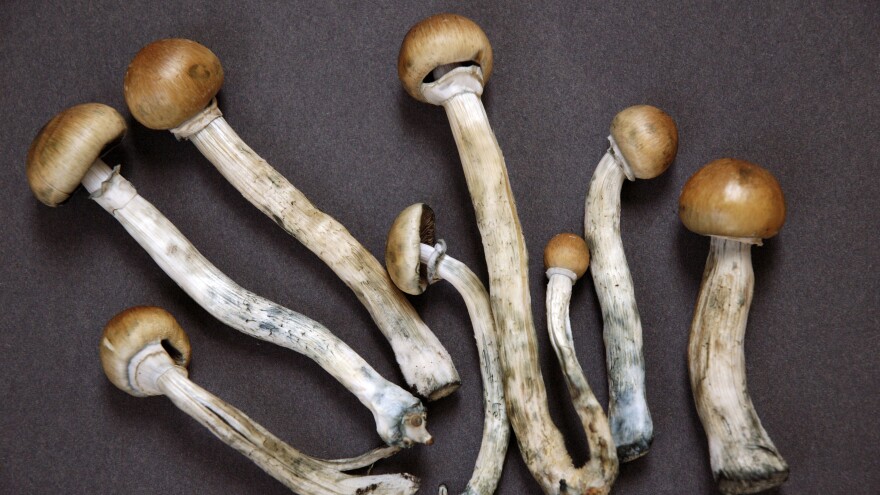When Juliana Mercer returned home from a combat-heavy deployment in Afghanistan, the Marine Corps veteran of 16 years kept serving her country by helping her wounded colleagues at a naval hospital. She was passionate about the work, but it was still difficult — and she began showing signs of PTSD.
"I was working with nonprofit organizations that were helping to support veterans and found myself in a place where I was doing really purposeful work, but no longer felt like I had a purpose," she said on IPR's River to River. "I also couldn't bring myself to continue working with veterans, so I had to stop doing something that I really loved, because working with them was just continually retriggering and reopening wounds of grief and trauma and pain, which I collected for a very long time, and eventually was kind of drowning in them."
Mercer tried different methods of treating PTSD with varying success before deciding to try a new type of therapy that involved taking psychedelic drugs. She traveled to Costa Rica, where she tried ayahuasca. When she returned home, she tried psilocybin, a hallucinogenic chemical in "magic mushrooms."
She felt relief after just one six-hour session.
"I was able to connect to all of that built up trauma and sadness and grief that I had collected and wasn't really able to experience... and during the psilocybin experience, I was able to release that," she said. "I woke up the next day and looked in the mirror and didn't recognize who I was looking at. I was reconnected to my joyful, loving, authentic self that I hadn't seen in many years."
"Would you call it a miracle for you, in your case?" host Ben Kieffer asked her on the show.
"Absolutely," Mercer replied.
A promising treatment
Experts say that research on the effects of psychedelic-based therapy is promising. A Phase 3 study on MDMA-assisted therapy for PTSD by the Multidisciplinary Association for Psychedelic Studies found that 88% of participants with severe PTSD experienced a clinically significant reduction in PTSD diagnostic scores two months after their third session of MDMA-assisted therapy, compared to 60% of placebo participants.
They also found that 67% of participants in the MDMA group no longer met the criteria for PTSD two months after the sessions, compared to 32% of participants in the placebo group.
At the University of Iowa, a clinical trial on how psychedelic drugs can impact people with alcohol use disorders will compare the use of psilocybin and ketamine. Ketamine, which is used as an anesthetic, has only been recognized for its use for treatment-resistant depression over the last 20 years or so.
"We're very excited to see what the results of this are," UI researcher Candida Maurer said. "And we're going to be doing brain imaging as well, so we're going to get a look at what these medicines do to the brain."
While a comparison between the two drugs may be the first study of its kind, studies on the effects of psychedelics are not new, nor are their promising results. The positive effects of LSD began being studied as far back at the 1950s, but for political reasons was shut down. Still, research continued undercover.
Now, Michael Flaum, a UI Hospitals and Clinics professor emeritus in psychiatry, says it's impossible to go to a psychiatric conference without major presentations on psychedelics, and FDA approval could be just around the corner.
"The National Institute of Health sponsored its first conference on psychedelics well over a year ago — it's firmly established," he said. "The pace of this is pretty quick. We expect MDMA to be available probably within a year or so, and many suggest that psilocybin is probably not more than three to four years from FDA approval."
In order to move ahead, however, Mercer says government funding is needed. "To date, all of the studies and around MDMA-assisted therapy have been through public funds and philanthropists. It's time for our government to get skin in the game and help support these clinical trials in the VA system."
A long road to legality
State Rep. Jeff Shipley, R-Birmingham, has advocated for the legalization of psychedelics in Iowa. He's introduced more than one measure addressing the issue, including a bill (HF 240), which died early in the 2023 legislative session. The bill proposed removing psilocybin and psilocyn from the state's list of Schedule I controlled substances, which classifies substances that have a "high potential for abuse and has no accepted medical use in treatment in the United States."
He says legal conversations about the drugs and general unfamiliarity about their uses and benefits are barring Iowa lawmakers from making any sort of leap.
"I think the mental health crisis is becoming kind of more acute and certainly a priority for the public, and people are desperate for therapies — or actual effective therapies that work — therapies that don't have a high rate of adverse outcomes," he said. "I think as the public is more familiar, I think that's kind of been our biggest challenge — is just explaining what psilocybin is to legislators that are maybe not familiar with the substance."
Psilocybin mushrooms are legalized only in Colorado and Oregon. They are decriminalized in other states, including Massachusetts and Washington D.C. and in some major cities like Seattle, Wash. and Ann Arbor, Mich.
Flaum said while MDMA is on track to be a federally recognized treatment, it could be a long time before it and other psychedelics can help Iowans. He also cautions that psychedelic treatment should be taken while assisted by trained medical professionals, and not treated as something simple or DIY.
He also noted there is a financial barrier in accessing these treatments. There are some clinics that administer ketamine treatments that don't accept certain forms of insurance, and the costs add up.
"One of the things that I really appreciate about what Juliana's group is doing is thinking now about access, and how these drugs are going to be made available," he said.
He said that implementation of these therapies will be slow so that they are done right.
"It is an extremely exciting area, but people should also recognize that it's going to take some time," he said. "We have to train a workforce, and we have to figure out how to deliver these medicines in a way that is going to be most effective."
A previous version of this article stated that many ketamine clinics, including one in Coralville, don't accept many forms of insurance. While Corridor Ketamine in Coralville offers IV Ketamine, which is a cash pay service not usually covered by insurance, the clinic also offers Spravato (esketamine), an intranasal ketamine option that is covered by most major insurance companies.




